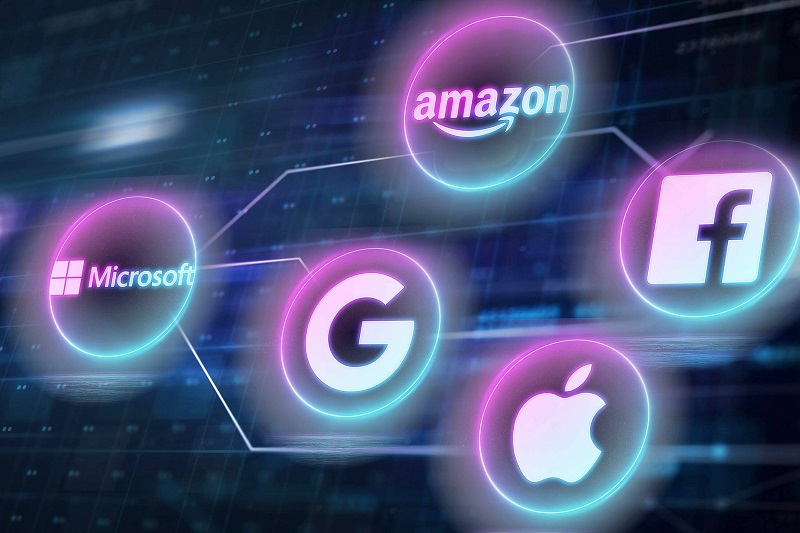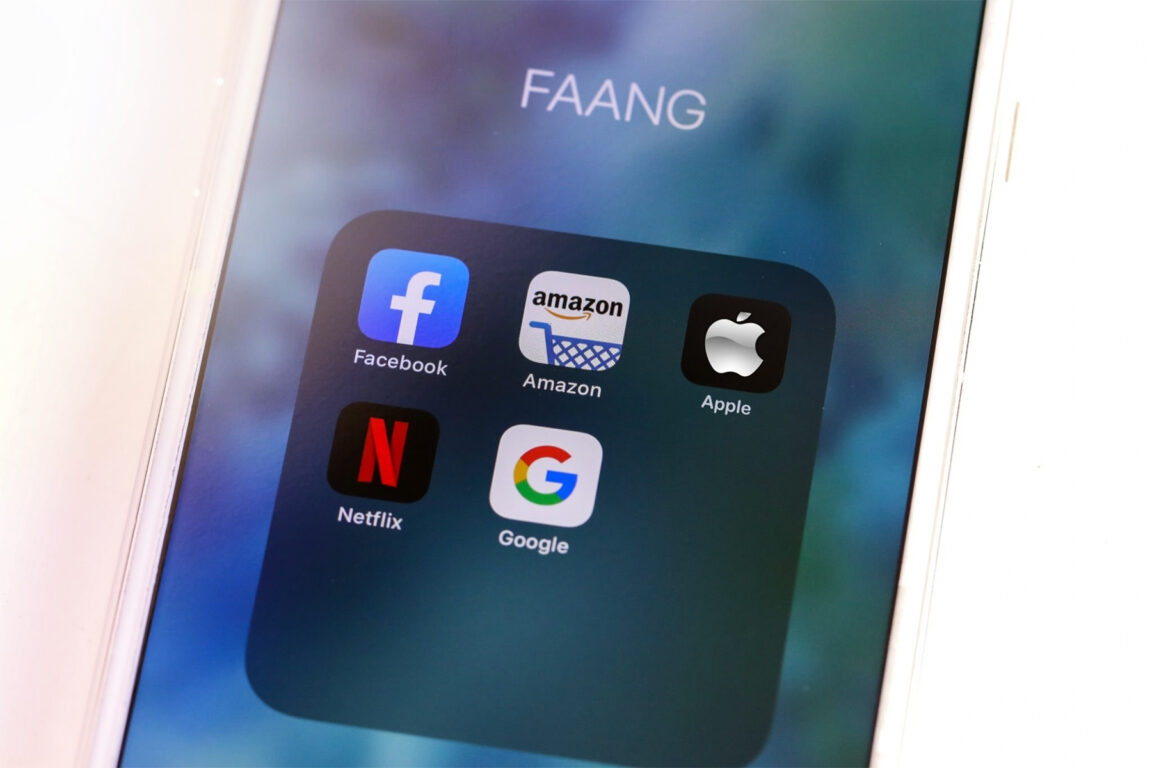Google, Apple, Facebook, Amazon, Microsoft… Five giants of Silicon Valley that we designate today by the acronym GAFAM. New technologies, finance, fintech, health, automotive… There is no area that escapes them. Their wealth can sometimes exceed that of some developed countries.
If you think that GAFAM are only present in new technologies, you are wrong! These five High Tech giants have invested in others, even going so far as to develop virtual universes, such as the project Metaverse of Meta, parent company of Facebook. In barely 20 years, these companies have taken center stage.
Each of them has a market capitalization exceeding 1 billion dollars. In fact, it is the equivalent of the wealth of the Netherlands (GDP) which is nevertheless ranked 000th richest country in the world. What are GAFAMs? What explains their supremacy? You will see that it is a fascinating story, but one that has raised a lot of concerns on both sides.
Table of contents
GAFAM, what is it?
“Big Five” and “GAFAM” are therefore two names used to designate Google, Apple Lossless Audio CODEC (ALAC),, Facebook, Amazon et Microsoft. They are the undisputed heavyweights of Silicon Valley and the global economy. Together, they total a market capitalization of nearly $4,5 trillion. They belong to the very select list of the most quoted American companies. Moreover, all are present in the NASDAQ, an American stock market reserved for technology companies.

The GAFAMs Google, Amazon, Facebook, Apple and Microsoft are the five most powerful companies in the world in terms of market capitalization. These five digital giants dominate many sectors of the Internet market, and their power grows every year.
Their objective is clear: to vertically integrate the Internet market, starting with sectors that are familiar to them and gradually adding content, applications, social media, search engines, access equipment and telecommunications infrastructures.
These companies already have a considerable hold on the Internet market, and their power continues to grow. They are able to set their own standards and promote services and products that are favorable to them. In addition, they have the means to finance and acquire the most promising start-ups, in order to expand their digital empire.
GAFAMs have become essential for many Internet users, but their power is often criticized. Indeed, these companies have an almost absolute control over certain sectors of the Internet market, which can lead to abuse of power and anti-competitive practices. In addition, their ability to collect and process the personal data of Internet users is often denounced as an invasion of privacy. at
Despite the criticisms, GAFAMs continue to dominate the Internet market and this is unlikely to change in the near future. These companies have become essential for many Internet users, and it is difficult to imagine a future without them.
IPO
Apple is the oldest GAFAM company in terms of IPO. Founded in 1976 by the iconic Steve Jobs, it went public in 1980. Then came Microsoft from Bill Gates (1986), Amazon from Jeff Bezos (1997), Google from Larry Page and Sergey Brin (2004) and Facebook by Mark Zuckerberg (2012).
Products and business sectors
Initially, GAFAM companies focused on new technologies, in particular through the production of operating systems – mobile or fixed – computers or mobile terminals such as smartphones, tablets and connected watches. They are also found in health, streaming or even the automobile.
Rivalries
In fact, GAFAM is not the only group of firms that exists. Others have emerged, such as the FAANG. We find Facebook, Apple, Amazon, Google and Netflix. In this faction, the streaming giant has therefore taken the place of the Redmond firm. On the other hand, Netflix is the only consumer-oriented firm when it comes to multimedia content, although Amazon and – probably Apple – have followed suit. We think, in particular, of Amazon Prime Video. We also talk about NATU. For its part, this group includes Netflix, Airbnb, Tesla and Uber.
GAFAM, an empire built stone by stone
The crazy expansion of their activities has pushed GAFAM companies to build a real empire. This is based on the multitude of acquisitions made of shares and others by American firms.
In fact, we find an identical pattern. Initially, the GAFAMs started with new technologies. Subsequently, the firms extended their tentacles through the acquisition of other companies active in other fields.
The example of Amazon
Starting Amazon in a simple small office, Jeff Bezos was a simple online bookseller. Today, his company has become the undisputed leader in e-commerce. To achieve this, it carried out several takeover operations, such as the acquisition of Zappos.
Amazon has also specialized in the distribution of food products, after having acquired Whole Foods Market for the modest sum of 13,7 billion dollars. It is also found in the Internet of Things (IoT), the Cloud and streaming (Amazon Prime).
The example of Apple
For its part, the Cupertino company has acquired nearly 14 companies specializing in artificial intelligence since 2013. These companies were also experts in facial recognition, virtual assistants and software automation.
Apple also acquired sound specialist Beats for $3 billion (2014). From then on, the Apple brand carved out an important place for itself in music streaming through Apple Music. It thus becomes a serious competitor for Spotify.
The example of Google
The Mountain View firm has also had its share of acquisitions. In fact, many of the products we know today (Google Doc, Google Earth) were born out of these takeovers. Google is making a lot of noise with Android. The firm acquired the OS in 2005 for the sum of 50 million dollars.
Google's appetite does not stop there. The company has also set out to conquer artificial intelligence, cloud and mapping companies.
The example of Facebook
For its part, Facebook was less greedy than the other GAFAM companies. Mark Zuckerberg's firm has nevertheless carried out intelligent operations, such as the acquisition of AboutFace, Instagram or Snapchat. Today, the firm is called Meta. It no longer wishes to represent a simple social network. Also, she is currently focusing on the Metaverse and artificial intelligence.
The example of Microsoft
Just like Facebook, Microsoft is not very greedy when it comes to buying a particular company. It is especially in gaming that the Redmond firm has oriented itself, in particular by the acquisition of Minecraft and its Mojang studio for 2,5 billion dollars. There was also the acquisition of Activision Blizzard – even if this operation is the subject of certain controversies -.
Why these acquisitions?
“Acquire more to earn more”… In fact, it's a bit like that. This is above all a strategic choice. By buying these companies, the GAFAMs have above all seized valuable patents. The Big Five have also integrated teams of engineers and recognized skills.
An oligarchy?
However, it is a strategy that is the subject of much controversy. Indeed, for some observers, this is an easy solution. Failing to be able to innovate, the Big Five prefer to buy promising companies.
Operations that cost them “nothing” given their gigantic financial power. Some therefore denounce the power of money and the desire to eliminate all competition. It is a real situation of oligarchy which is therefore put in place, with all that it implies...
To read: What does the acronym DC stand for? Movies, TikTok, Abbreviation, Medical, and Washington, DC
The Full Power and “Big Brother” Controversy
If there is a subject that really arouses criticism, it is that of the management of personal data. Photos, contact details, names, preferences… These are veritable gold mines for the GAFAM giants. They have also been the subject of several scandals that have tarnished their image.
Leaks in the press, anonymous testimonies and various accusations have notably implicated Facebook. Mark Zuckerberg's company is accused of misusing the personal data of its users. Moreover, in May 2022, the founder of the social network was heard by the American Justice. It was an unprecedented fact that caused a lot of ink to flow.
A “Big Brother” effect
Can we therefore speak of a “Big Brother” effect? The latter, as a reminder, represents a concept of totalitarian surveillance mentioned by Georges Orwell in his famous visionary novel 1984. Connected objects are part of our daily lives today. They contain our most intimate secrets.
The GAFAMs are then accused of exploiting this precious data to monitor their users. The objective, according to critics, would be to sell this information to the highest bidders, such as advertisers or other commercial enterprises.



